BULLET TRAIN (2022)
Five assassins aboard a swiftly-moving bullet train find out that their missions have something in common.
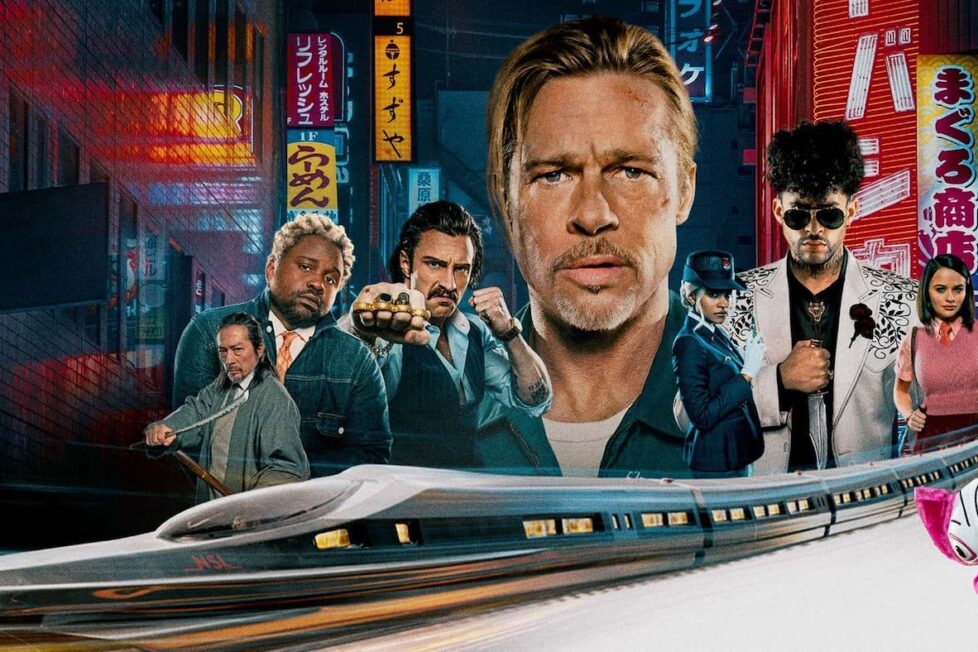
Five assassins aboard a swiftly-moving bullet train find out that their missions have something in common.


David Leitch began his career as a stunt coordinator with no intention of directing, but he’s since become a filmmaker whose sensibilities have defined the past decade of Hollywood action. After making John Wick (2014) with Chad Stahelski, the pair earned widespread acclaim for the film’s impeccably choreographed fight sequences. Since then Leitch has directed big-budget fare of his own, such as Deadpool 2 (2018) and Fast and Furious Presents: Hobbs & Shaw (2019), with his latest offering more of the same irreverent escapism. Based on the Japanese novel Maria Beetle by Kõtarõ Isaka, Bullet Train is an exciting blend of mischievous humour and kinetic action.
A freelance professional assassin assigned the codename ‘Ladybug’ (Brad Pitt) is hired to steal a briefcase being transported via a bullet train from Tokyo to Kyoto. Determined to do his job peacefully, he leaves his gun behind and boards the train expecting an easy mission. However, Ladybug’s cursed with misfortune when he realises two British assassins are already in possession of the item. Tangerine (Aaron Taylor-Johnson) and Lemon (Brian Tyree Henry) are transporting said briefcase to the notorious Russian gangster ‘White Death’, and Ladybug’s objective is further complicated when various other assassins board the train with their own mysterious aims. As the train hurtles towards Kyoto, fate inevitably manoeuvres Ladybug into an escalating spiral of violence where any encounter could mean death.
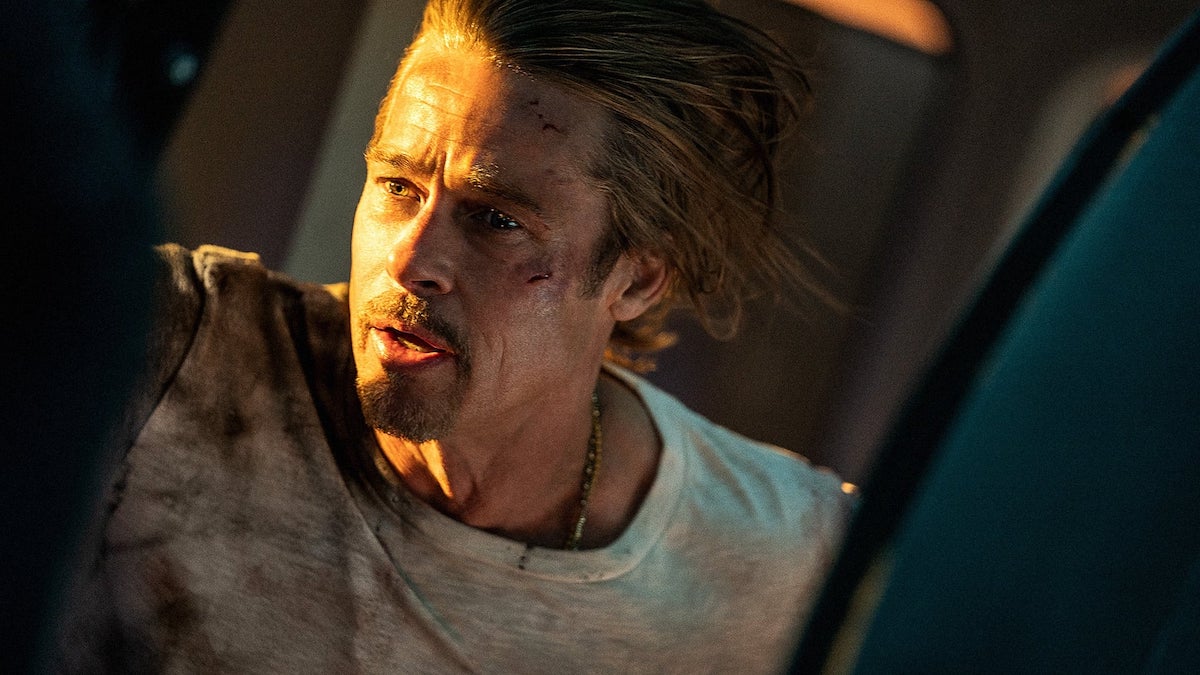
With such a large and consistently good cast, it’s almost criminal to single out key players. The titular train’s carriages are populated by a plethora of colourful personalities and the ensemble is completely on board with the material. Channelling the freewheeling personality of his brief but memorable appearance as Jack Trainer in The Lost City (2021), Pitt is effortlessly charismatic as the privately contracted operative, Ladybug. After seeking a more peaceful and enlightened path through Buddhist teachings, he’s re-evaluated his violent lifestyle and is more interested in conflict resolution. Unlike most protagonists Ladybug chooses not to carry a firearm, but he’s fully armed with sardonic humour and hilarious philosophical proverbs (“you put peace out into the world, you get peace back”). Demonstrating he’s at his best with the right comedic material, Pitt imbues his character with his subtle charm and roguish humour, drawing on his charming demeanour from The Mexican (2001) and Burn After Reading (2008), he flourishes with such quirky material and is an absolute pleasure to watch.
Also seated in first class are numerous mercenaries who have their own missions and conflicting agendas. However, the unquestionable scene-stealers are Brian Tyree Henry (Eternals) and Aaron Taylor-Johnson (Tenet) as British assassins Tangerine and Lemon. Tangerine is easily the most lovable character in the story, and Henry actor elevates every scene as he makes observations about people’s personalities using the characters from Thomas the Tank Engine. Meanwhile, Taylor-Johnson effortlessly matches his co-star with his own natural charisma as Lemon, rivalling Jason Statham’s performance in Snatch (2000) as he growls punchlines through a thick moustache. Henry and Taylor-Johnson have fantastic chemistry and they complement each other’s comedic strengths. Their brotherly banter is infectious and brings a fine touch of comedy and camaraderie to the screen. There’s a sense of Laurel and Hardy about the duo as they’re repeatedly outwitted but tied irrevocably by loyalty.
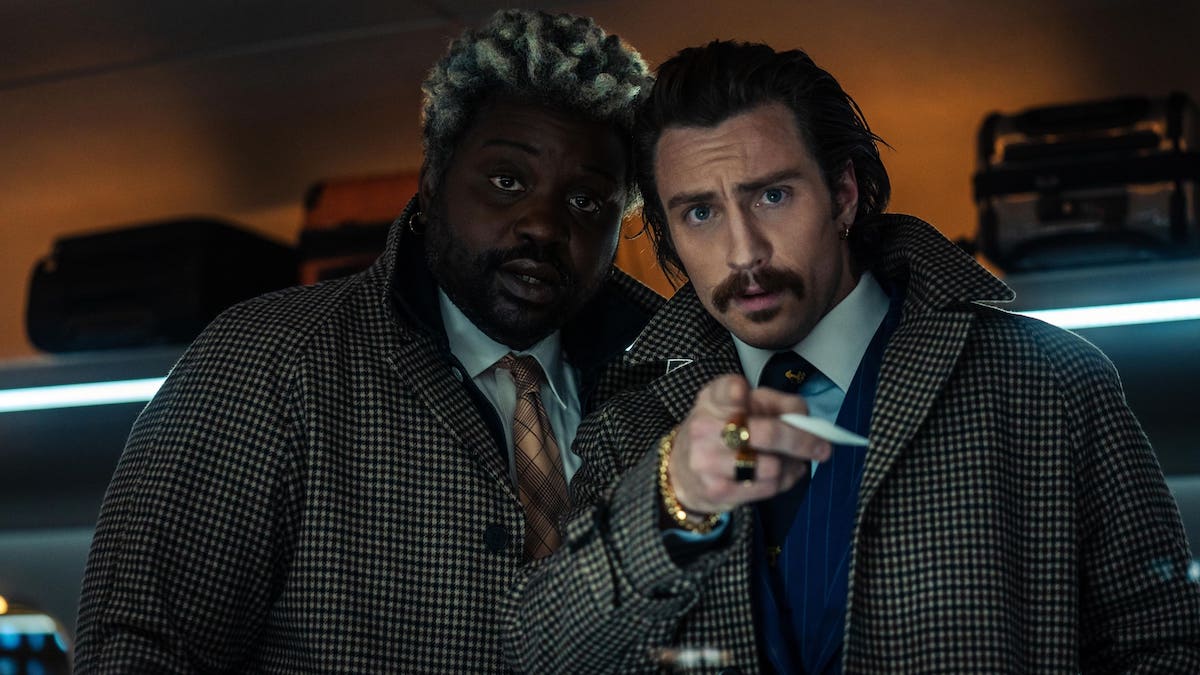
After establishing himself as an uncredited co-director of John Wick (2014), Leitch has since become one of Hollywood’s finest action directors. As demonstrated in Atomic Blonde (2017), the veteran stunt coordinator’s strengths are mostly on display during entertaining and hyper-kinetic action sequences. The fight choreography and gunplay are all perfectly harmonised for what’s undoubtedly Bullet Train’s shining achievement. Leitch utilises every square inch of the train’s geography and incorporates its design elements into each fight sequence. A seatbelt is used to strangle an enemy whereas a laptop instantly becomes a deadly weapon. The slapstick nature feels indebted to Rumble in the Bronx (1995) as Leitch dreams up imaginative uses for everything during the confined battles. One of the most enjoyable set-pieces is a beatdown between Ladybug and Lemon in the train’s quiet car. As both assassins wrestle, their muffled punches are occasionally punctuated by an angry “shush” from a disgruntled passenger.
The fantastically conceived fight choreography isn’t the only area in which Bullet Train excels. The production team deserves immense praise for realising the perfect backdrop for the director’s hyperactive imagination. Constructed with the same level of verve and wry irreverence that Leitch brought to Deadpool 2, its mischievous nature and playful energy are generally welcome after Netflix’s programmatically mundane The Grey Man (2022). Set in a country known for its proficiency, Elísabet Ronaldsdóttir’s (Shang-Chi and the Legend of the Ten Rings) editing keeps everything moving faster than a speeding bullet. Similar to Danny Boyle’s Trainspotting (1996), each character is introduced with a stylised flashback adorned with Japanese Kanji and English neon text. Although these sequences threaten to derail the first act, they provide the necessary context for how the various denizens boarded the same train. Whereas the acrobatic cinematography by Jonathan Sela (Atomic Blonde) humorously captures the action with a comic book aesthetic. Admittedly, Bullet Train is incredibly stylised, but it’s executed in a way that keeps everything visually engaging throughout.
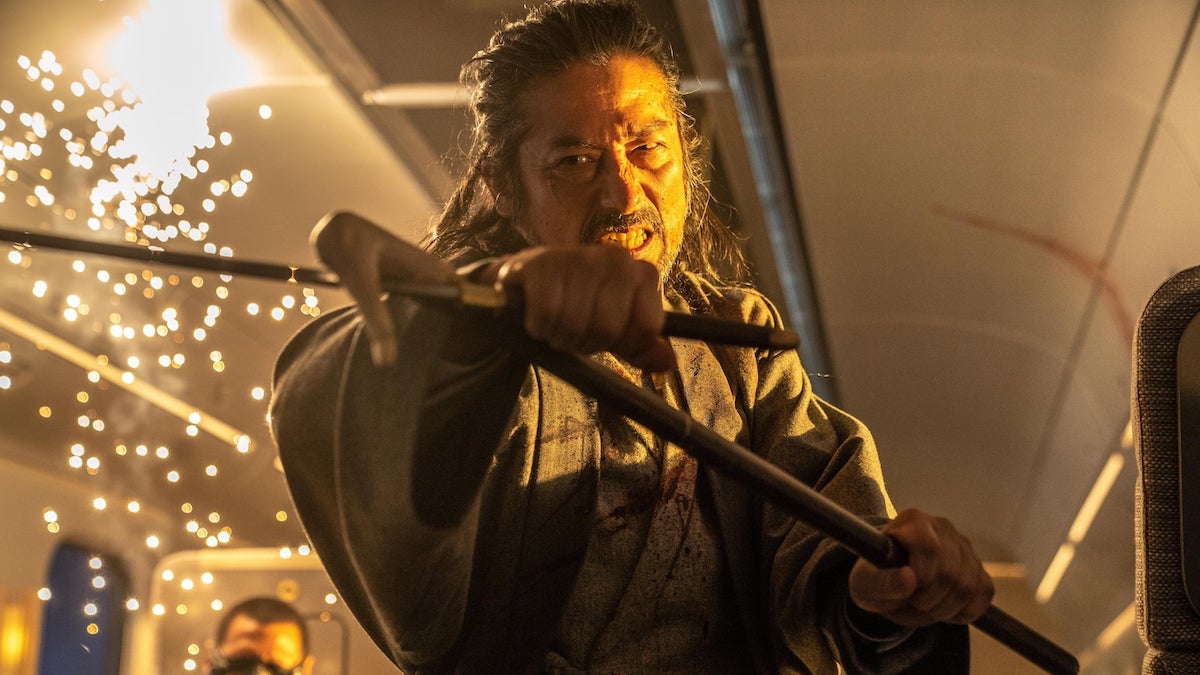
There’s scarcely a moment to breathe during Bullet Train, but that’s one of its best qualities. Kõtarõ Isaka’s original novel was a mystery thriller with overlapping narratives and chaotic characters. Zak Olkerwicz’s (Fear Street Part Two: 1978) screenplay adaptation is an intricate piece of writing and remains a somewhat faithful adaptation of the source material. Coinciding with Ladybug’s assignment, several less conventional plot elements include a missing venomous snake and a poisoned water bottle. There’s an arsenal of Chekhov’s Guns but Leitch displays precise control over the convoluted narratives as they eventually culminate together in satisfying ways. The derivative comparisons to Quentin Tarantino are inescapable, and superficially, Bullet Train has many similarities to Pulp Fiction (1994). The frenetic flashback sequences, anecdotal monologues, and non-linear storytelling are all hallmarks of Tarantino’s seminal classic. Although such comparisons are warranted, cinema is perhaps beginning to reach a plateau where any of these techniques are considered imitation. One could argue Leitch incorporates enough of his own quirks and Bullet Train shares more similarities with John Woo’s The Killer (1989) and Takashi Miike’s First Love (2019).
In a market dominated by mediocre sequels and reboots, it’s refreshing to see something even half as original as Bullet Train. Leitch crafts an incredible action spectacle with flamboyant and colourful energy that feels sadly missing from many actioners. It takes audiences on a wild journey across Japan while delivering plenty of humour. Brad Pitt’s offbeat comedy is consistently entertaining and he drives the cast to elevate their performances. Brian Tyree Henry and Aaron Taylor-Johnson’s quick-witted chemistry create a great double act that is genuinely hilarious. Their playful charisma and comedic timing provide plenty of laughs throughout and make this better than the average action flick.
USA • JAPAN | 2022 | 127 MINUTES | 2:39:1 | COLOUR | ENGLISH • JAPANESE • RUSSIAN • SPANISH

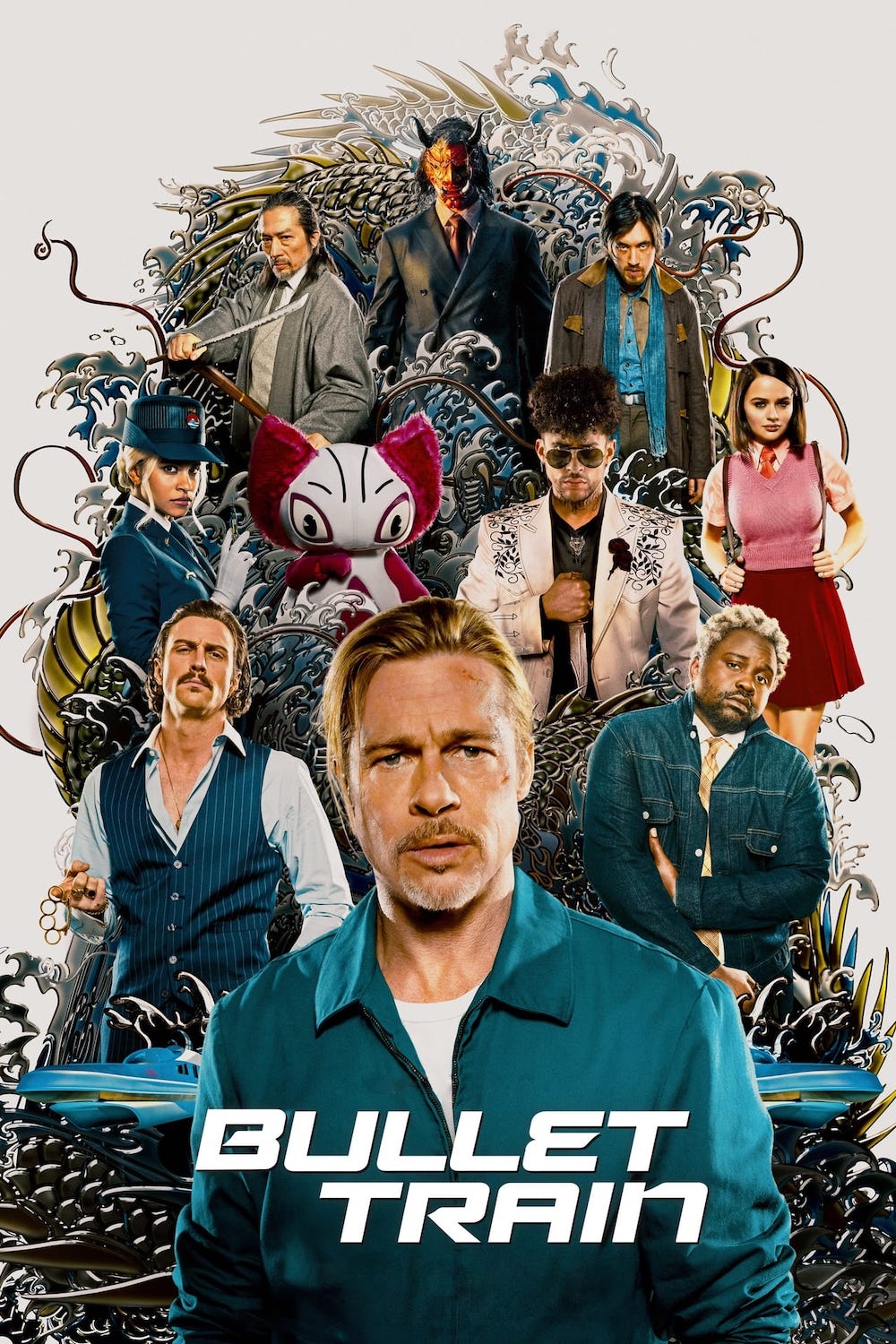
director: David Leitch.
writer: Zak Olkerwicz (based on the novel by Kõtarõ Isaka).
starring: Brad Pitt, Joey King, Aaron Taylor-Johnson, Brian Tyree Henry, Andrew Koji, Hiroyuki Sanada, Michael Shannon & Sandra Bullock.
